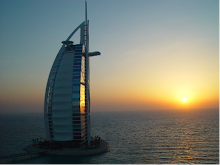In 1970, Oman had 10 miles of paved road, no organized educational or health care system, and its fledgling oil economy was faltering. Sultan Qaboos Bin Said took the throne at the turn of the decade, and was faced with a looming economic dilemma: diversify or begin to witness the decline and decay of a once oil-rich Middle East economic power. Part of this dilemma also included major issues with Islamic traditions. Bin Said recognized that he had to incorporate every member of his society, even if it meant going against what his culture had traditionally done. He knew that by incorporating this one factor, potentially even a major competitive advantage, he could gain ground on neighboring nations and their quickly diversifying economic planes.
Bin Said began to introduce women as his front-runners to lead his economic overhaul and expansion.
Fast forward to present day, and the 3.5 million citizens share an enviable prosperity, women have training and career opportunities equal to men, traditional culture and Muslim religious practices are honored, and international differences are respected. Better yet, bin Said has chosen a woman to head the new Ministry of Tourism - Oman's new economic powerhouse.
I am beginning to notice a trend after my latest research into Oman. I am finally beginning to understand, from a culmination of my international business courses (a majority of which coming from my research on the Middle East), intercultural communication training, and overseas experience, that globalization has nearly reached its peak in world affairs. This globalizing trend, comprised of a migration of ideas, individuals, education, language and commerce are affecting every area of our small world. From Rwanda to Oman to Siberia to Abu Dhabi, billions upon billions of the earth's citizens are becoming more and more dependant on one another. The trend, however, that I am noticing is a combination of the keen competitive advantage factor and the assimilation of cultural differences across international borders. Individuals in every reach of society are slowly, but surely, beginning to realize the importance of incorporating the world's accepted ideas and perspectives with expansion within their own societies, traditional cultures, businesses and governments. In order to be accepted, and at least considered, by the international community, an entity such as a government or a corporation must adapt, reformat and include. It is inevitable that the world will only continue to become smaller, flatter (term keyed by Thomas Freidman) and more accessible by a majority of its inhabitants.
The nations of the "Other Middle East" have recognized this trend, and jumped on before it has gotten too late. Other nations, such as Saudi Arabia, have held on firmly to their roots, specifically religious traditions. They are a very conservative nation, barely allowing women to enter the general work force. This has not only unfortunately tarnished their international image by not treating every member of society as equals, but forbade many multinational companies from penetrating this market, thus preventing many potentially lucrative investment opportunities.
We individuals who have been exposed to this international community, worked with "foreigners," witnessed the differences, begun to accept them and adapt to them understand that as other nations will not allow certain things, we likewise have to be wary of upsetting or offending them with our apathy and ignorance. As universal understanding becomes more prevalent, differences will become more relevant and noticeable, but I feel that with such channels and resources like the Internet, we will witness a general acceptance by a majority of individuals in our world. Wars are inevitable, and some people will never emerge from their "bubbles," but that is another story. This may happen many decades, or centuries into the future, but we are truly witnessing the one of the largest transitions of global understanding in history.
With that tangent tackled and off of my mind, I would like to re-introduce Oman in all of it's glitz an glamor. Virtually every ambitious Omani has gone abroad to study, work and live, only to return to their homeland with a better understanding of the world, its cultures and exactly what people want. With Oman's oil reserves virtually tapped, their tourism industry is on the rise, and is their dominant economic sector. Historic Muscat, the nation's capital, is bustling with visitors from every reach of the globe. Europeans are attracted to the grandeur of the capital's castles, only to rest their heads in one of the 2 dozen 5 star hotels.
Just as bin Rashid Maktoum did in Dubai, bin Said has realized the tremendous economic potential by basing his national economy on the justice and principles of a free economy. Bin Said has done such a tremendous job in transforming the face of his nation's economic stance. He began in 1970, introduced a basic 5-year plan to introduce new facets of the economy. Then in 1995, he held a conference titled "Vision Conference: Oman 2020." This 25 year plan outlined his economic goals for Oman, including the reshaping of the role of the government in the economy, the broadening of private sector participation, diversification of the economic base and sources of income, and to ultimately globalize the Omani economy as much as possible. He even posted a 15% raise in worker's salaries, placing Oman in the category of high-medium income countries of the world. It is tremendous economic plans and historic transformations such as this that nations across the world are in dire need of. As risky as they may be, they are almost necessary to keep up with and compete with today's global economies.
In the coming decades, we will certainly witness a shift in economic power, mainly (middle) East, and far East. Oman is a prime example of a successful step, one which has the next 12 years of its economic life planed out and molded perfectly for economic success.
Monday, February 25, 2008
Subscribe to:
Post Comments (Atom)



No comments:
Post a Comment